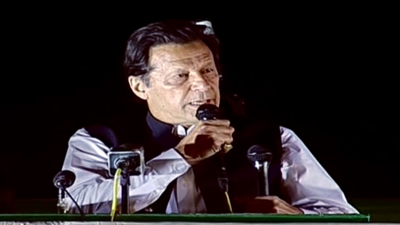Top Searches
- News
- World News
- Pakistan News
- 'Would never approach a forum associated with Rushdie': Facing flak, Imran Khan 'clarifies' on comments
'Would never approach a forum associated with Rushdie': Facing flak, Imran Khan 'clarifies' on comments

NEW DELHI: Did Imran Khan take a "soft line" on Salman Rushdie after the stabbing incident, and then try a "course correction?"
Possibly.
Imran had to face flak from several quarters following his comments on the incident in an interview to The Guardian, including from PML-N leader Ishaq Dar.
In Pakistan, infamous for lopsided blasphemy laws and a stranglehold of Islamic hardliners on all wings of governance, any sympathy towards those perceived guilty of infringement to Islam is not taken kindly.
And it seems the former Pakistan Prime Minister took a false step when he described the attack on Rushdie as "terrible" and "sad."
Rushdie was stabbed by a 24-year-old New Jersey resident identified as Hadi Matar, a US national of Lebanese origin, on stage last week while he was being introduced at a literary event in Western New York.
While the anger of the Islamic world at Rushdie’s book The Satanic Verses was understandable, it could not justify the assault, Khan said in the interview.
Imran then gave a clarification on Twitter that his comment was “taken out of context.”
“In the interview, I explained the Islamic method of punishing blasphemers,” he said.
He maintained that he had given the example of the Sialkot tragedy and had spoken of Rushdie in a similar context. Imran was referring to the brutal lynching of a Sri Lankan national in Sialkot over blasphemy allegations, reports in the Pakistan media said.
"Rushdie understood because he came from a Muslim family. He knows the love, respect, and reverence of the prophet that lives in our hearts. He knew that. So, the anger I understood, but you can't justify what happened," the PTI party chief had stated earlier in his interview with The Guardian.
He justified his position by referring to his decision to back out from an event in India in 2012, where Rushdie was also invited. Later, he reiterated that his “views on Rushdie are clear”, and he would never approach a forum associated with the author.
Rushdie, who was born in India to a Muslim Kashmiri family, has lived with a bounty on his head and spent nine years in hiding under British police protection.
Rushdie's fourth book 'The Satanic Verses', released in 1988, forced him into hiding for nine years.
The late Iranian leader Ayatollah Ruhollah Khomeini accused Rushdie of blasphemy over the book and in 1989 issued a fatwa against him, calling for his death. Rushdie's writing has led to death threats from Iran, which has offered a $3 million reward on his head.
Possibly.
Imran had to face flak from several quarters following his comments on the incident in an interview to The Guardian, including from PML-N leader Ishaq Dar.
In Pakistan, infamous for lopsided blasphemy laws and a stranglehold of Islamic hardliners on all wings of governance, any sympathy towards those perceived guilty of infringement to Islam is not taken kindly.
And it seems the former Pakistan Prime Minister took a false step when he described the attack on Rushdie as "terrible" and "sad."
Rushdie was stabbed by a 24-year-old New Jersey resident identified as Hadi Matar, a US national of Lebanese origin, on stage last week while he was being introduced at a literary event in Western New York.
While the anger of the Islamic world at Rushdie’s book The Satanic Verses was understandable, it could not justify the assault, Khan said in the interview.
Imran then gave a clarification on Twitter that his comment was “taken out of context.”
“In the interview, I explained the Islamic method of punishing blasphemers,” he said.
He maintained that he had given the example of the Sialkot tragedy and had spoken of Rushdie in a similar context. Imran was referring to the brutal lynching of a Sri Lankan national in Sialkot over blasphemy allegations, reports in the Pakistan media said.
"Rushdie understood because he came from a Muslim family. He knows the love, respect, and reverence of the prophet that lives in our hearts. He knew that. So, the anger I understood, but you can't justify what happened," the PTI party chief had stated earlier in his interview with The Guardian.
He justified his position by referring to his decision to back out from an event in India in 2012, where Rushdie was also invited. Later, he reiterated that his “views on Rushdie are clear”, and he would never approach a forum associated with the author.
Rushdie, who was born in India to a Muslim Kashmiri family, has lived with a bounty on his head and spent nine years in hiding under British police protection.
Rushdie's fourth book 'The Satanic Verses', released in 1988, forced him into hiding for nine years.
The late Iranian leader Ayatollah Ruhollah Khomeini accused Rushdie of blasphemy over the book and in 1989 issued a fatwa against him, calling for his death. Rushdie's writing has led to death threats from Iran, which has offered a $3 million reward on his head.
FOLLOW US ON SOCIAL MEDIA
FacebookTwitterInstagramKOO APPYOUTUBE
Start a Conversation
end of article










